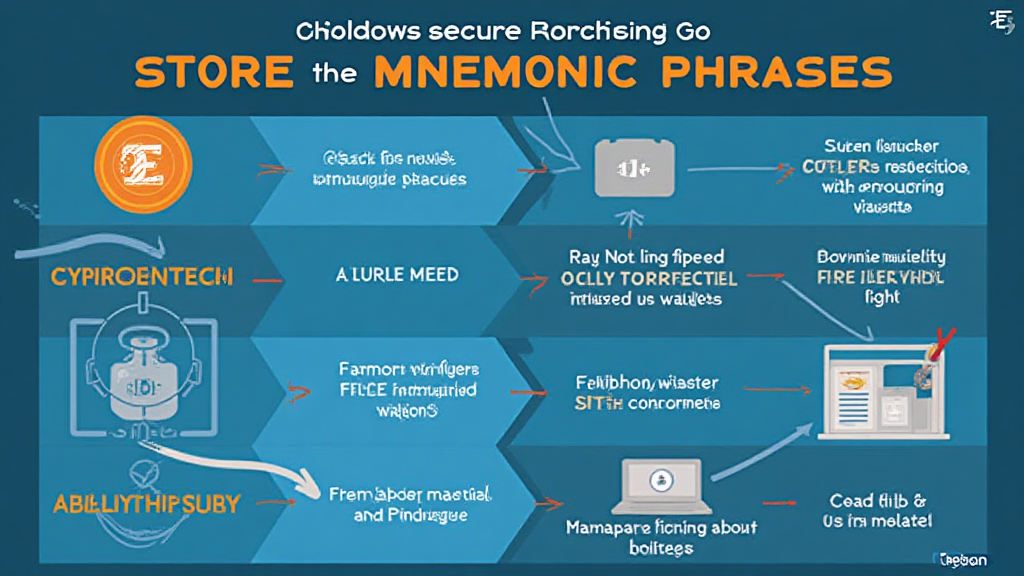Introduction: The Growing Need for Security in Cryptocurrency
In today’s digital age, securing assets is more critical than ever. Did you know that in 2024 alone, vulnerabilities in decentralized finance (DeFi) platforms resulted in over $4.1 billion being lost to hacks? This alarming statistic highlights the pressing need for enhanced security protocols in the blockchain sphere, especially in regions like Vietnam where user engagement with cryptocurrencies is surging. In fact, according to recent reports, Vietnam has witnessed an impressive user growth rate of over 30% in the past year within the cryptocurrency space.
As cryptocurrencies become mainstream, the need for effective mnemonic phrase storage solutions becomes vital. This article will take a comprehensive look at HIBT Vietnam mnemonic phrase storage, covering key security standards and practices necessary to protect your digital assets.
Understanding Mnemonic Phrases: What Are They?
To properly secure your digital assets, you first need to understand what mnemonic phrases are. A mnemonic phrase, also known as a seed phrase, is a series of words that serve as a human-readable representation of a cryptographic key.

- Mnemonic phrases typically consist of 12, 15, 18, 21, or 24 words.
- These phrases provide access to your cryptocurrency wallet.
- They are crucial to restoring wallets on different devices or after loss.
To illustrate the importance of these phrases, think of them as the key to a bank vault where your cryptocurrencies are stored. If someone gets this key, they can access your assets. Thus, protecting your mnemonic phrase is paramount.
The Risks of Inadequate Mnemonic Phrase Storage
Let’s break it down. Storing your mnemonic phrases in an insecure manner exposes you to significant risks. Here are a few potential threats:
- Physical Theft: If your mnemonic phrase is written down and stored in an easily accessible location, it can be stolen along with your device.
- Cyberattacks: Storing your phrase in a cloud service without encryption can put you at risk of online theft.
- Loss of Access: If you lose your mnemonic phrase without any backup, you risk losing access permanently to your digital assets.
The importance of secure mnemonic phrase storage methods cannot be overstated, especially in a burgeoning market like Vietnam.
Best Practices for Storing Your HIBT Vietnam Mnemonic Phrases
Now that you understand the risks, let’s look at best practices for securely storing your mnemonic phrases:
- Hardware Wallets: Devices like the Ledger Nano X can significantly reduce hacks by securely storing your mnemonic phrases offline.
- Paper Wallets: Writing your phrase down and storing it in a safe, physical location can also be a secure option, though it requires meticulous care to avoid physical damage.
- Encryption: If you choose to store your mnemonic phrase digitally, make sure to use encryption tools to safeguard your data from prying eyes.
Why Are Hardware Wallets Important?
The use of hardware wallets is often likened to having a safe deposit box at a bank. They isolate your mnemonic phrases from the internet, dramatically decreasing the chances of unauthorized access. According to a 2025 analysis by “Chainalysis,” hardware wallets have shown to be 70% more effective in preventing hacks compared to software wallets.
Security Standards for Blockchain in Vietnam
As the digital landscape evolves, so do the security standards. Vietnam is increasingly introducing regulations to ensure safe practices in cryptocurrency transactions. The tiêu chuẩn an ninh blockchain (blockchain security standards) focus on:
- Data encryption for transaction records.
- Secure smart contracts.
- Authentication protocols to verify user identities.
These standards are set to provide a robust framework for projects implementing blockchain technologies. As users adopt cryptocurrencies, adhering to these standards will not only facilitate safer transactions but also increase public trust in the systems.
Compliance and Regulatory Framework
Vietnam is developing regulations for the cryptocurrency industry. As investors, understanding these regulations is vital for compliance. Not only do you want to protect your assets, but avoiding legal pitfalls is equally critical.
Ensure that you:
- Stay informed about local laws pertaining to cryptocurrency.
- Consult with financial experts when necessary to ensure compliance with regulations.
Remember, being compliant doesn’t just protect you legally—it builds trust with your clients and peers.
Future Trends in Mnemonic Phrase Storage and Blockchain Security
As we move toward 2025 and beyond, several trends are expected to emerge that will impact mnemonic phrase storage:
- Biometric Authentication: Increased use of biometrics, like fingerprints or facial recognition, will further enhance security.
- Decentralized Storage Solutions: New innovations may lead to the development of distributed storage networks, where mnemonic phrases can be stored securely across multiple nodes.
Each of these future trends offers exciting potential for enhancing the security and usability of mnemonic phrases, particularly for Vietnamese users eager to make the most of their digital assets.
Conclusion: Safeguarding Your Digital Future
As the cryptocurrency market continues to grow, so does the need for robust security measures, especially concerning mnemonic phrase storage. Implementing best practices, adhering to emerging regulations, and staying ahead of trends will ensure that you protect your investments effectively.
With the rapid growth of cryptocurrencies in Vietnam, it is essential to prioritize security to prevent the loss of assets. Remember that investing in proper mnemonic phrase storage methods is not just a choice; it’s a necessity.
If you want to learn more about protecting your digital assets, visit hibt.com, your go-to resource for comprehensive blockchain security information.
By actively securing your cryptocurrencies, you’re investing in a more secure and prosperous digital future.
Author: Dr. John Smith
Dr. John Smith is a blockchain and cybersecurity expert, having published over 15 papers in the field and led audits for notable projects in the cryptocurrency domain.


